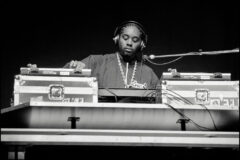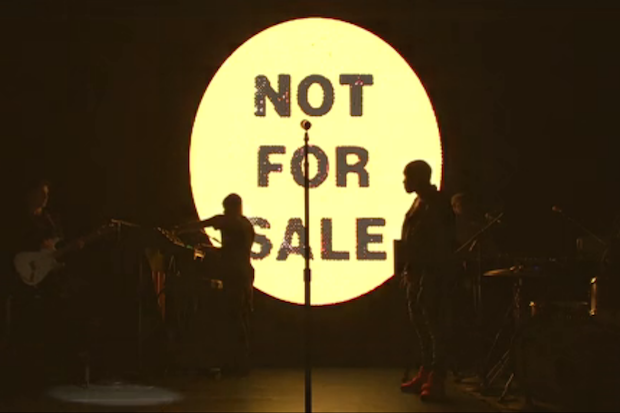Projected onto a wall in 66 different locations across the globe on Friday Night, Kanye West’s new single, “New Slaves,” off his upcoming album Yeezus, is vital, singular, muddled, and fairly hypocritical, like a lot of Kanye West statements. He expresses frustration with the way his aspirational raps have been imbibed and misread by everybody: “What you want, a Bentley? Fur coat? A diamond chain? / All you blacks want all the same things / Used to only be niggas, now everybody’s playing / Spending everything on Alexander Wang / New Slaves.”
The point seems to be that those things which Kanye perceived as aspirational, or even transgressive, have with his help become painfully middle-brow and attainable. It’s a diss song aimed, supposedly, at people like the clueless cast of Entourage or forever-ballin’ Parks & Recreation characters Tom Haverford and Jean-Ralphio Saperstein, types who don’t get it even though they think they totally get it. Also, given Kanye’s quasi-beef with Justin Timberlake, it seems aimed at JT and his faux-petulant return, which seemed to crib a few moves from hip-hop’s “y’all miss me?” swagger. In addition, the “New Slaves” lines about corporate control (“Fuck you and your corporation”), along with his anti-corporation rant back in February (and the “NOT FOR SALE” sign that flashed in the background of Kanye’s Saturday Night Live performance), seems to take aim at Timberlake. Or, rather, the corporate crossover that has fueled The 20/20 Experience is the perfect symbol for what Kanye dislikes about cosmopolitan-urban pop music right now, even if it is filled with the signifiers that he helped establish as cool and artistic: Ambition, impeccable synergistic taste, and an almost feckless, shittin’-on-you-crumbs attitude.
Kanye’s Saturday Night Live performance was the centerpiece of a weekend spent hyping Yeezus. The first song he performed was called “Black Skinhead.” A noble attempt at the noise-rap of Death Grips or B L A C K I E, it felt more like a hip-hop version of Marilyn Manson’s “Beautiful People” — that same post-Pretty Hate Machine industrial-pop gallop. He performed it in a leather jacket, as images of snarling dogs and rapid-fire cuts of loaded phrases flashed in the background (again, most notably, “NOT FOR SALE”). SPIN’s Chris Martins contextualized the spectacle well: This was the hum-drum set of SNL, turned into something truly terrifying for a few minutes.
Still, “New Slaves” had more thrust and poignant anger. And Kanye seemed to know this, performing it without the performance-art padding and a whole lot of raw, uncooked passion. For “New Slaves,” he stared into the camera while an extreme black-and-white close-up of his face was projected in the background (if you’ve seen Portishead live lately, you know what Kanye’s doing here), almost screaming the lyrics of the final verse.

Also Read
GEAR THAT MADE THE GAME: Rap Machinery
That final verse of “New Slaves” was special. It’s where Kanye’s focus spirals out to something bigger than his own concerns and perceived martyrdom. Instead, he’s genuinely wielding his power and speaking on topics that he doesn’t exactly have to address as a big-deal star: The corruption of our prison system. “Slaves” in the final verse are not slaves to high-end mall fashion, but to a prison system that incarcerates an inordinate number of African-Americans, and due to private ownership, has money invested in keeping those people in jail for as long as possible and bringing in even more. It’s Kanye rapping a Spark Notes version of Michelle Alexander’s The New Jim Crow and “the Willie Lynch Letter.” And don’t forget his pithy, lewd, rejection of Diddy-birthed hip-hop Hamptons’ love: “Fuck you and your Hampton house / I’ll fuck your Hampton spouse? / Came on her Hampton blouse / And in her Hampton mouth.” “New Slaves” speaks to the narrative that always grabs fans who’ve been with Kanye since The College Dropout: It’s another ambitious, naïve attempt to resolve the tensions between his aspirational, money-burning id and his conscious rap-raised super ego. He might have finally done it, here.
Mostly what you’re left with on “New Slaves,” though, is that still-not-entirely understood message of Watch the Throne: That Kanye West is an immensely successful black artist whose parents were part of the Civil Rights generation, who had to fight for their basic freedoms. People who, as he raps in the first lines of “New Slaves,” drank at different water fountains than whites: “My momma was raised in an era when / Clean water was only served to the fairer skin.” It’s a nice rejoinder to ongoing “post-racial” nonsense, and an assured, half-earned argument that everything a big-deal type like Kanye does must be considered and pondered because he represents a specific kind of American success story.
So, here’s an art-rock star rapper (he is our Pink Floyd, whether you want to admit it or not), projecting his face on a wall in 66 cities, then appearing on Saturday Night Live, clowning clueless conspicuous consumption, rejecting the increasingly corporate-sponsored world of the media, and rapping about the corrupt prison system. It’s a politically engaged, swinging-dick move. And the menacing, minimalist beat seems like the next step after he got an evil lurcher like “Mercy” onto the radio. As with so many recent Kanye West event-singles, “New Slaves” will be huge, almost in spite of its anti-pop intentions.




